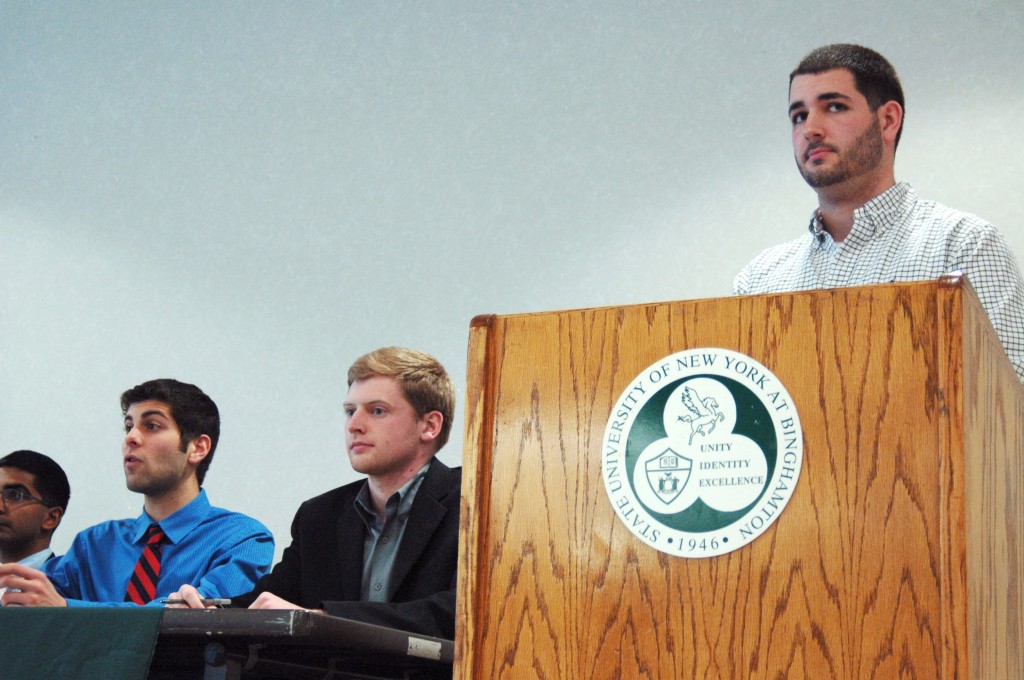
Wednesday’s Student Association Town Hall Forum gave student groups the opportunity to air their concerns with Executive Board members regarding SA legislation and procedures.
The forum came out of the SA’s desire to increase transparency between themselves and student groups. Many of the proposed plans involved increased student engagement throughout Binghamton University.
“We are a unified force that is prepared and excited about what we’ve done and about what we’re planning to do,” said Samson Widerman, executive vice president of the SA E-Board and a senior double-majoring in English and philosophy, politics and law.
Following brief introductions involving positional duties and recent accomplishments, E-Board members offered up their plans for the semester. Students in attendance posed questions to the SA, first anonymously on index cards and then openly in response to answered questions.
Student concern centered largely on budgets and finances for individual student groups. Ravi Prakriya, the vice president for finance (VPF), addressed some of these concerns, acknowledging that while student groups need money, the SA can only provide so much.
“I empathize with all of you, but by empathizing with all of you I can help none of you. If everyone wants another $300, I need to have another $3 million,” said Prakriya, a junior double-majoring in finance and mathematics. “It’s everyone’s money. It’s my money, too, and you don’t get to spend my money unless your paperwork’s golden.”
One submission questioned the fairness of the VPF’s discretion on any group’s proper use of budget and on whether or not it is deserving of a certain amount of funding.
“Once you’re chartered, more often than not, your funding is a function of your efficiency,” Prakriya said.
He also addressed group missions, saying that if a group’s mission is entirely religious, for example, giving them public funds is against the law.
Prakriya also announced that Off Campus College Transport (OCCT) would be expanding this year’s bus fleet by five or six more buses.
Derrick Conyers, vice president for academic affairs, touched upon the University’s policy for repeating courses. According to policies for most schools within the University, students can retake a failed course and have the new grade averaged into their GPA. However, if a student were to pass with a low grade and retake the course, the new grade would not be averaged into their GPA.
While he said he has spoken with higher-ups to mandate a change, according to Conyers, many of his efforts have gone ignored by officials who won’t allow students to sit in on meetings regarding the policy.
“SOM actually did the opposite of what we asked … so I apologize for that,” Conyers said. “If it’s implemented, it’s going to be University-wide.”
Mariana Moriello, vice president for programming and a senior double-majoring in anthropology and psychology, said the SA Programming Board has booked four artists for Spring Fling, and they’re looking to book two more.
Maria Ortiz, the president of Habitat for Humanity, said she was pleased with the SA allowing students to voice their concerns.
“It sort of bridged that disconnect between the SA and student groups on campus,” said Ortiz, a junior double-majoring in political science and Spanish.
Alex Charen spoke on behalf of the girls’ club lacrosse team during the open Q&A, airing concerns about budgeting for club sports. Prakriya responded, explaining that the SA budgets all club sports a fixed amount of money that is divided internally between the groups.
“The needs of a club sport are fairly separate from other SA groups, and we know the amount of money that can be given to club sports is limited so we do with it what we can,” said Charen, president of girls’ club lacrosse and a senior majoring in marketing.
Lucy Schwartz, the president of Chabad, said she believes that in the past, the SA has handled the concerns of her group well. However, she expressed dissatisfaction with how the forum played out.
“Every time anyone asked a question, they were told why they were wrong,” said Schwartz, a senior majoring in English. “It felt more they were telling us there didn’t even need to be a discussion about our questions because they already knew the answers.”
The girls’ club lacrosse team brought the highest member turnout, winning the offered $150 prize.


